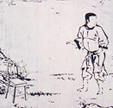Wealth and Democracy
Wealth and Democracy,[1] by Kevin Phillips, is a history of the connections between money and politics through the last five hundred years or so. Packed with charts and graphs and fascinating details, the book resists simple encapsulation. However, I’m going to give it a try, starting with Spain.
Spain under King Ferdinand and Queen Isabella produced wool, textiles, and steel. But that began to change when plunder from the New World arrived. Crown revenues doubled and then doubled again, but the money was not invested in Spain’s real economy:
In the words of one seventeenth-century Spaniard, “The possession and abundance of such wealth altered everything. Agriculture laid down the plough…trade put on a noble air, and exchanging the work-bench for the saddle, went out to parade up and down the street.” (Wealth and Democracy, p. 179)
Instead of improving Spain’s infrastructure, the wealthy wasted their riches on extravagance and foreign adventures. The decline in agriculture and industry meant a decline in jobs, squeezing the middle-class and increasing the divide between rich and poor. Hidalgos (gentlemen) were exempted from taxes, and the middle-class faced an ever-growing tax burden.
As the finance sector surpassed agriculture and industry, the influx of easy money drove up prices, making foreign goods cheaper and further undermining domestic production. Predictably, the rich invested more and more money in foreign countries offering higher rates of return:
“The result,” according to a leading historian, “was the growth of a powerful rentier class in Castile, investing its money not in trade or industry but in annuities.” (p. 180)
In 1600, Martin Gonzalez de Cellorigo wrote that Spain had:
“come to be an extreme contrast of rich and poor, and there is no means of adjusting them to one another. Our condition is one in which we have rich who loll at ease, or poor who beg, and we lack people of the middling sort, whom neither wealth nor poverty prevents from pursuing the rightful kind of business enjoined by natural law.
…[Wealth is] being dissipated on thin air — on papers, contracts, censos, and letters of exchange, on cash, and silver, and gold — instead of being expended on things that yield profits and extract riches from outside to augment the riches within.” (p. 180)
Successive rulers mortgaged future shipments of gold and silver to pay for war. Eventually, despite the flood of plunder from the New World, two-thirds of Spain’s revenues went to debt service.
The Dutch empire followed a similar trajectory. Its finance sector outstripped agriculture and industry. The middling sort dwindled, and the Dutch empire collapsed:
Finance began to displace hands-on commerce. As early as the 1650s, traders in Amsterdam had complained that the ruling burgomasters and regents, once themselves in trade, now “derived their income from houses, land and money at interest.” (p. 181)
James Boswell’s notes from a 1764 visit are often cited: “Most of their principal towns are sadly decayed, and instead of finding every mortal employed, you meet with multitudes of poor creatures who are starving in idleness.” (p. 182)
Isaac Pinto, a Dutch economic writer, had found it worrisome in 1771 that bonds, shares, and foreign funds “were the linchpin of civic wealth and status, the principal pillar of the social system, a system quite unlike that existing in other countries.” (p. 183)
Britain’s empire also went down that road and arrived at the same destination. Wealth brought sloth, not jobs, and widened class divisions. Infrastructure was neglected; the middle-class shrank. Colonial Secretary Joseph Chamberlain worried that financialzation of the economy made the country richer and weaker, a mere “hoarder of invested securities.” From 1870 to 1906, Britain’s share of world manufacturing production was cut in half. Wages fell while the upper crust pursued stocks, bought yachts, and shot pheasants. In 1908, Winston Churchill wrote:
“The seed of imperial ruin and national decay — the unnatural gap between the rich and the poor…the swift increase of vulgar, jobless luxury — are the enemies of Britain.” (p. 171)
Does any of this sound familiar? It should. The economy of the early United States was based primarily on agriculture. Industry gradually surpassed agriculture, and the U.S. became the greatest creditor nation on earth. But the finance sector, growing by leaps and bounds, overtook industry in the 1980s and 90s.
Now, we are the greatest debtor nation on earth. Jobs are shipped abroad; cheap foreign goods pour in. Infrastructure is crumbling. The gap between the well-off and the destitute is greater than at any time in our history. The rich clamor for lower taxes — or no taxes at all. They seek the return of primogeniture and entail[2] through the elimination of estate taxes. The tax burden falls ever more heavily on the middling sort who are shrinking in numbers. When our riches are not being dissipated on the thin air of derivatives, they are wasted on war.
The political right looks at the staggering wealth compiled by a tiny percentage of Americans and calls it progress. See? The system works!


0 Comments:
Post a Comment
<< Home